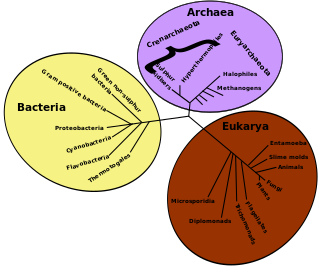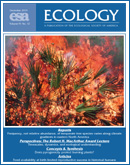
Evolutionary biology is the subfield of biology that studies the evolutionary processes that produced the diversity of life on Earth. It is also defined as the study of the history of life forms on Earth. Evolution holds that all species are related and gradually change over generations. In a population, the genetic variations affect the phenotypes of an organism. These changes in the phenotypes will be an advantage to some organisms, which will then be passed onto their offspring. Some examples of evolution in species over many generations are the peppered moth and flightless birds. In the 1930s, the discipline of evolutionary biology emerged through what Julian Huxley called the modern synthesis of understanding, from previously unrelated fields of biological research, such as genetics and ecology, systematics, and paleontology.

Heredity is a monthly peer reviewed scientific journal published by Nature Portfolio. It covers heredity in a biological sense, i.e. genetics. The journal was founded by Ronald Fisher and C. D. Darlington in 1947 and is the official journal of The Genetics Society. From 1996 the publishing was taken over by Nature Portfolio. The editor-in-chief is Sara Goodacre.
Proceedings of the Royal Society is the main research journal of the Royal Society. The journal began in 1831 and was split into two series in 1905:

Evolutionary ecology lies at the intersection of ecology and evolutionary biology. It approaches the study of ecology in a way that explicitly considers the evolutionary histories of species and the interactions between them. Conversely, it can be seen as an approach to the study of evolution that incorporates an understanding of the interactions between the species under consideration. The main subfields of evolutionary ecology are life history evolution, sociobiology, the evolution of interspecific interactions and the evolution of biodiversity and of ecological communities.

Ecology is a scientific journal that publishes research and synthesizes papers in the field of ecology. It was founded in 1920 as the continuation of Plant World, and is published by the Ecological Society of America. According to the Journal Citation Reports, it is currently ranked 15th out of 136 journals in the Ecology category.

Biology Letters is a peer-reviewed, biological, scientific journal published by the Royal Society. It focuses on the rapid publication of short high quality research articles, reviews and opinion pieces across the biological sciences. Biology Letters has an average turnaround time of twenty four days from submission to a first decision.
Simon Asher Levin is an American ecologist and the James S. McDonnell Distinguished University Professor in Ecology and Evolutionary Biology and the director of the Center for BioComplexity at Princeton University. He specializes in using mathematical modeling and empirical studies in the understanding of macroscopic patterns of ecosystems and biological diversities.

The Annual Review of Ecology, Evolution, and Systematics is an annual scientific journal published by Annual Reviews. The journal was established in 1970 as the Annual Review of Ecology and Systematics and changed its name beginning in 2003. It publishes invited review articles on topics considered to be timely and important in the fields of ecology, evolutionary biology, and systematics. As of 2022, Journal Citation Reports gave the journal a 2021 impact factor of 14.340, ranking it third of 173 journals in the "Ecology" category and third of 51 journals in "Evolutionary Biology".

John Philip Grime was an ecologist and emeritus professor at the University of Sheffield. He is best known for the universal adaptive strategy theory (UAST) and the twin filter model of community assembly with Simon Pierce, eco-evolutionary dynamics, the unimodal relationship between species richness and site productivity, the intermediate disturbance hypothesis, and DST classification.

Current Biology is a biweekly peer-reviewed scientific journal that covers all areas of biology, especially molecular biology, cell biology, genetics, neurobiology, ecology, and evolutionary biology. The journal includes research articles, various types of review articles, as well as an editorial magazine section. The journal was established in 1991 by the Current Science group, acquired by Elsevier in 1998 and has since 2001 been part of Cell Press, a subdivision of Elsevier. According to Journal Citation Reports, the journal has a 2020 impact factor of 10.834. It was categorized as a "high impact journal" by the Superfund Research Program.
Theodore Garland Jr. is a biologist specializing in evolutionary physiology at the University of California, Riverside.
BMC Ecology and Evolution, previously BMC Evolutionary Biology (2001–2020), is a peer-reviewed open access scientific journal covering all fields of evolutionary biology, including phylogenetics and palaeontology. It was established in 2001 and is part of a series of BMC journals published by BioMed Central.

The American Journal of Primatology is a monthly peer-reviewed scientific journal and the official journal of the American Society of Primatologists. It was established in 1981 and covers all areas of primatology, including the behavioral ecology, conservation biology, evolutionary biology, life history, demography, paleontology, physiology, endocrinology, genetics, molecular genetics, and psychobiology of non-human primates. Besides its regular issues, the journal publishes a yearly supplementary issue detailing the program of the society's annual meetings. The editor-in-chief is Karen Bales. The types of papers published are: original research papers, review articles, book reviews, commentaries, and plenary addresses.

Functional Ecology is a monthly peer-reviewed scientific journal covering physiological, behavioural, and evolutionary ecology, as well as ecosystems and community ecology, emphasizing an integrative approach.

Journal of Zoological Systematics and Evolutionary Research is a quarterly, peer reviewed, scientific journal, published by Wiley-Blackwell. It was originally established in 1963, then reestablished in 1994 by John Wiley & Sons. The editor in chief is Dr. Wilfried Westheide. According to Journal Citation Reports, the 2016 impact factor for this journal is 2.444.

Evolutionary Computation is a peer-reviewed academic journal published four times a year by the MIT Press. The journal serves as an international forum for researchers exchanging information in the field which deals with computational systems drawing their inspiration from nature.
Cultural evolution is an evolutionary theory of social change. It follows from the definition of culture as "information capable of affecting individuals' behavior that they acquire from other members of their species through teaching, imitation and other forms of social transmission". Cultural evolution is the change of this information over time.

Nature Ecology and Evolution is an online-only monthly peer-reviewed scientific journal published by Nature Publishing Group covering all aspects of research on ecology and evolutionary biology. It was established in 2017. Its first and current editor-in-chief is Patrick Goymer.
Jeannine Cavender-Bares is a Distinguished McKnight University Professor at the University of Minnesota in the Department of Ecology, Evolution & Behavior. Her research integrates evolutionary biology, ecology, and physiology by studying the functional traits of plants, with a particular focus on oaks.
Virus Evolution is an open access scientific journal of virology published by Oxford University Press. It was launched in 2015 and focuses on all aspects of virus evolution and ecology, including the long-term evolution of viruses, viruses as a model system for studying evolutionary processes, virus classification, viral molecular epidemiology, viral phylodynamics, and environmental virology.












